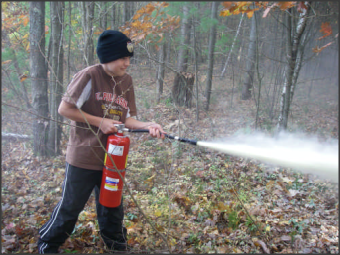Fire Safety Program
Pine Haven has the only program in the state that offers intensive services to latency aged children with fire behaviors at this level.
Pine Haven Boys Center has a formal program to include assessment, therapy, home based services and a psycho-educational component for the children and families in fire education, understanding the dynamics of fire setting behavior, communication and limit setting.

Fire setting was once viewed as a crime perpetrated primarily by adults, but arson committed by children under the age of 18 is responsible for over 50% of all arson arrests (Snyder). This behavior can be successfully addressed with the appropriate treatment within a well structured, highly supervised treatment program. According to the research on children and fire behaviors, there is an 89% recidivism rate for children without specific intervention for fire behavior. That number is significantly reduced to 15% with intervention.(Mass. Coalition Juvenile Fire setting).
Pine Haven’s population has increased from one third to one half of the children with fire behaviors over the last few years. The children need a specific program to address this dangerous behavior as well as a program that is specific to their needs. These children will eventually return to a community, their own homes, a foster home, or another residential setting. Although there are no guarantees the odds are that without intervention the recidivism rate is 89%. Four out of five children will use fire again. The rate decreases to 15% with intervention. This creates a high risk situation for these children to move to the least restrictive setting safely without comprehensive treatment.
Once the child is admitted to the program we immediately begin the assessment phase of treatment. Our Clinical Director assesses the child for risk of safety and danger and determines the motivation for his firesetting behavior. The child may set a fire due to a crisis in his life such as physical or sexual abuse, the loss of a parent, or domestic violence. It may be delinquency related or a red flag for more chronic mental health issues.
Once the assessment has been completed the treatment team including the therapist, clinical director, teachers and residential staff, child and family develop a safety plan to help manage the safety of the community. They begin their long term treatment in individual, group and family therapy.
The second major component other than addressing the trauma is providing the child with Fire Safety Education which is combined within a treatment group.
In Family therapy parents and the therapist work on their safety plan as well as developing communication skills, parenting skills and age appropriate limit setting skills. Many of our parents are learning to maintain consistency as well as learning new techniques in parenting difficult children.
The success of this program is measured by a pre- and post- Fire Knowledge Test completed by the child and the parent.
The Assessment Phase alone will bring state workers tremendous benefits. First, it will increase their knowledge and understanding of the child’s psychological makeup. Second, it will also provide the child’s level of risk to a community and the motivation for this behavior. This will allow for the workers to make better placement decisions as well as recommendations for the children and family and their continued treatment needs.
Pine Haven has the only program in the state that offers intensive services to latency aged children with fire behaviors at this level. The children are in need of these services and as care givers it is our duty and responsibility to provide them. We must continue to build on our current program. The special needs of children require various mediums for teaching. The population of children at Pine Haven learn by seeing, touching, hearing, and doing. This effort must continue so that our communities and our children can safely return to their communities. This work will reduce the fire risk currently endangering our communities
